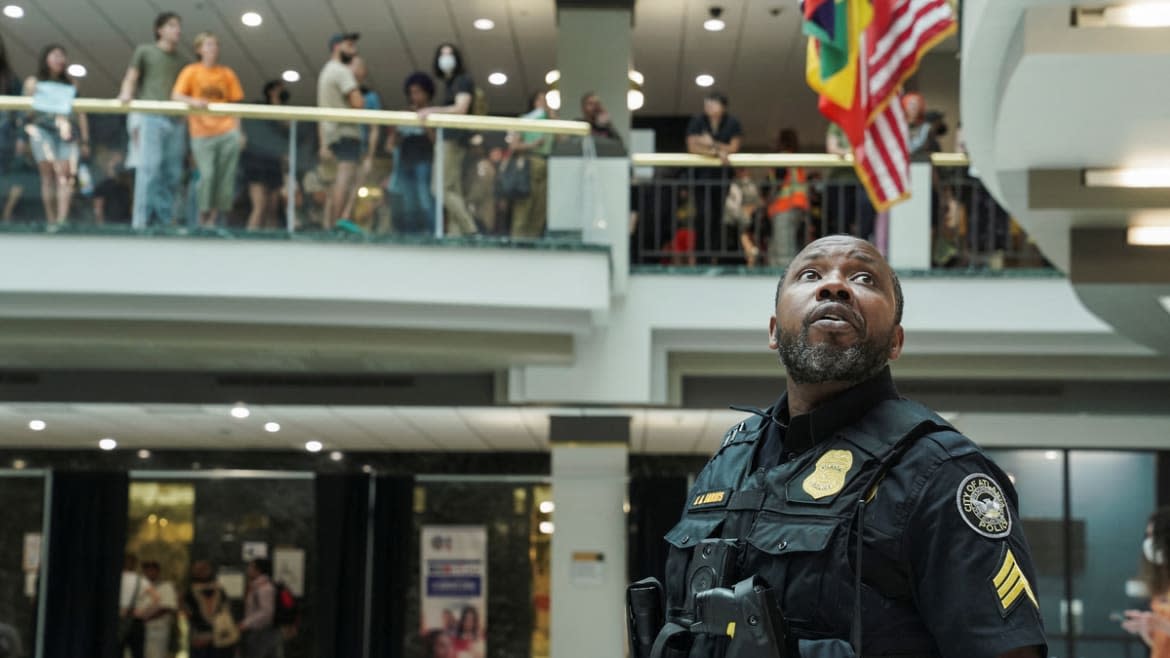Atlanta Activists Are Racing to Stop $33.5 Million ‘Cop City’ Funding

A controversial police training facility needs more than $30 million from Atlanta taxpayers. But during more than seven hours of public comment at a packed city council meeting on Monday, hundreds of locals expressed unanimous opposition to the project.
The Atlanta Public Safety Training Center—called “Cop City” by challengers—is a proposed $90 million, 85-acre police training ground slated for construction in Atlanta’s South River Forest. The project has seen opposition from environmental, racial justice, and indigenous rights activists, who argue that the project will cut down a forest on historically Native American land and fuel aggressive policing. After a series of protester arrests, and the killing of one activist by police, the project is now close to breaking ground. And opposition is louder than ever.
Georgia Activist Killed by Cops Had Gunshot ‘Residue’ on Hands, Police Say
“I’ve been to City Hall for some years now,” Micah Herskind, an Atlanta-based community organizer who attended the Monday meeting, told The Daily Beast. “But until the Monday city council hearing, “I’ve never seen the line at the door, even, of where the public comment sign up is. It was out the door, around the whole second floor, winding down the stairs, and then eventually went out through the building, through the security line. I’ve never seen anything like it. And not only did masses of people show up, they showed up literally 100 percent against Cop City. We did a complete tally of public comments. 100 percent of commenters were against Cop City.”
The purpose of the meeting was to hear public comments on a bill that would give the police training project $33.5 million in city funds, approximately $16 million of which must be signed over to the construction project by the end of June. (The city’s payout has edged up in recent months, from earlier estimates of $30 million, then $32 million.)
Not one of the nearly 300 speakers supported the spending.
“People were not only talking about not wanting Cop City. They were also saying, ‘hey, you have $30 million? Put that in our schools, put that in affordable housing, put that in our streets, put that in childcare, in food for people, for people who are homeless,” Herskind said.
Other speakers pointed to the city’s history of aggressive policing. Atlanta father Jimmy Hill, whose son was shot and killed by police in 2019, used the public comment period to return a proclamation the city had awarded his family after the killing. The proclamation condemned gun violence, which Hill said was a mischaracterization of his son’s death.
“Call it what it is: police brutality is police brutality. Stop trying to sugarcoat it. It’s police brutality, a police killing,” Hill said.
Hill also used the comment period to condemn the police killing of Manuel Esteban "Tortuguita" Paez Terán, an activist who was camping in the South River Forest in opposition to the Cop City construction. On Jan. 18, police opened fire on Terán’s tent, shooting the activist at least 57 times. Police claimed Terán had fired a gun—a claim strongly disputed by Terán’s family and complicated by autopsy reports. An independent autopsy by Terán’s family suggested that their hands were up at the time of the shooting. An autopsy by DeKalb County could not make a definite determination about Terán’s posture, but found no evidence of gunshot residue on their hands. A report by the Georgia Bureau of Investigation found traces of gunshot primer residue on Terán’s hands, but noted that the residue can also land on gunshot victims. No body camera footage of the killing is available.
"I think about my son because he was unarmed and surrendering,” Hill said of the two shootings.
Hill is not the only person to return awards to Atlanta in protest of the police training site. Terán’s death, and the mass arrests of people at an anti-Cop City music festival, have drawn national scrutiny to the project as it nears its planned August groundbreaking.
Civil rights leader Angela Davis, who received a proclamation from Atlanta in March, returned the award days later.
“I regret that I did not consider the implications of my acceptance of this award at the time, given the fact that the City Council voted in favor of the construction of a massive militarized police training facility in the South River Forest,” Davis said in an April statement.
Other civil rights leaders also spoke out against the project last month, in a growing trend of public opposition to the construction.
Bernice King, daughter of Martin Luther King Jr. and leader of Atlanta’s King Center for Nonviolent Social Change, penned an April op-ed opposing the training center at its proposed location.
“I urge you to rapidly expand your efforts in police and justice reform and a new approach to holistic community safety and wellness that engenders trust and confidence in police and policymakers,” King wrote to city officials. “I also urge you to revisit the programming and design of the training center and to identify a more suitable location. Ignoring the calls of the community will only multiply the cries. “
Atlanta’s City Council is slated to vote on the $33.5 million funding on June 5. A failed funding vote is not necessarily a dealbreaker (the police foundation behind the project is trying to raise $60 million of its own), but it might be activists’ best legal avenue for blocking the project.
“I think it would significantly hamstring the project,” Herskind said. “It wouldn’t cancel the lease, but it would be the council effectively removing its blessing from the project. In my mind, the city would have no choice but to choose a new path.”
Got a tip? Send it to The Daily Beast here
Get the Daily Beast's biggest scoops and scandals delivered right to your inbox. Sign up now.
Stay informed and gain unlimited access to the Daily Beast's unmatched reporting. Subscribe now.

